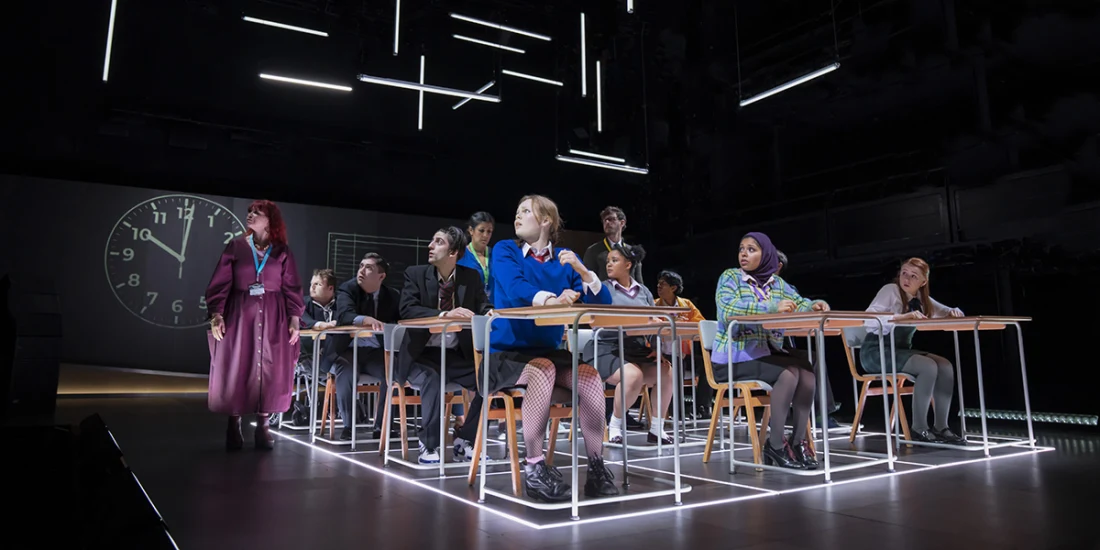'Our Generation' review — a verbatim teenage drama breaks theatre boundaries
Does our tendency to create stereotypes stem from our brains taking mental shortcuts? When trying to understand someone, we're much more likely to rely on a set of assumptions that we learn through the media, rather than taking the time to find out more about someone for ourselves. No matter how open-minded we perceive ourselves to be, this all happens within the unconscious inner workings of our mind. When it comes to Gen Z — whether it's calling them Tik Tok junkies or Netflix obsessives — there is an inescapable fog of preconceptions that is associated with this generation.
Alecky Blythe's new play Our Generation pierces through the fog to create space for the actual voices of Gen Z'ers within a thrilling theatrical production. Blythe and her creative team whittled down 656 hours worth of real interviews taken over five years with 12 young people from across the UK to create the play. The result is an astonishing and lively account of the thoughts, feelings and experiences of a diverse group of people in their own words, impressively helmed by director Daniel Evans.
Beginning in 2015 and ending in 2020, we whistle through the major and minor events during the intervening years. This includes panic-inducing GCSE exams, Brexit, parents' evenings, the election of Trump, exam results day and the unprecedented 2020 lockdown. Snippets from each of the interviews are interspersed throughout and are delivered by a cast with an abundance of energy and charisma.
The production incorporates verbatim theatre; actors not only recite the words from real interviews but also deliver the inflections, the stutterings and reflective pauses as they search for the right words. In doing so, the monologues and dialogues all flow much more like the pace of natural speech rather than a rehearsed performance. This helps to make the individuals that they are meant to portray that much more believable, effectively conveying their youth and innocence.
Another interesting dimension is that there isn't one overarching storyline. The play is a collection of scenes in which the actors walk in and out of centre stage, inviting the audience to peek into these seminal moments in their lives. Although it may feel strange not having a usual dramatic arc, you still feel invested in finding out whether the young'uns will end up 'alright' in the end. This makes the third act set during lockdown all the more jarring knowing that two years later, we're still not out of the woods of the pandemic quite yet.
The creative team struck gold with finding such an interesting crop of teens and pre-teens with wildly contrasting personalities. Aspiring basketball player Luan (Hélder Fernandes) is a gifted sportsman but his poor academic results threaten to hold him back. Athletic wheelchair user Taylor (Callum Mardy) has grand ambitions of competing in the Olympics and dedicates a tattoo to his sweetheart — a young romantic.
On first appearances, public schoolboy Lucas (Joe Bolland) is very privileged and has impressive prospects. However, we come to learn that he's slowly crushing under this mounting weight of pressure to follow in the footsteps of his gifted older brothers.
Emily (Poppy Shepherd) has brilliant grades and most of her concerns centre around passing her driver's test, her exams and being head of house at school. This starkly contrasts with Mia (Sarita Gabony) who is horribly mistreated in an abusive relationship with an older man. Her main concerns are to overcome her crippling anxiety and depression while trying to avoid following in the footsteps of her parents.
Despite the wide-ranging material in which everyone faces challenges, albeit not of equal weighting, we are still invited in to empathise with each of the school kids. Credit must go to Blythe for her skill in sensitively crafting this juggernaut piece of theatre.
Carrie-Anne Ingrouille's beautifully choreographed break-out dance scenes assist in tying the drama together. In these moments, the characters unite in their shared experiences on topics such as social media use, love and insecurities. Although there are commonalities and intersectionalities, Gen Z is certainly not a monolith. We see that the perplexing beauty standards created through social media use for example have an impact on each of the individuals in different ways.
My main criticism preventing me from raving about Our Generation is that the play runs long. Very long. 3 hours and 40 minutes to be more precise, including two intervals. After the punchy first act, the drama did unfortunately sag in parts and some of the scenes could be tightened to maintain interest throughout.
Our Generation is an undeniably ambitious undertaking and worthy of high admiration for how all the components work together as well as they do. The play challenges audiences to develop a more complex and richer understanding of the UK's young generation during the challenging times we live in. For those who have the temperament to sit through its long-running time, you'll be treated to an extraordinarily original and boundary-pushing piece of theatre.
Our Generation is at the National Theatre to 9 April.
Photo credit: Our Generation at National Theatre (Photo by Johan Persson)
Originally published on
